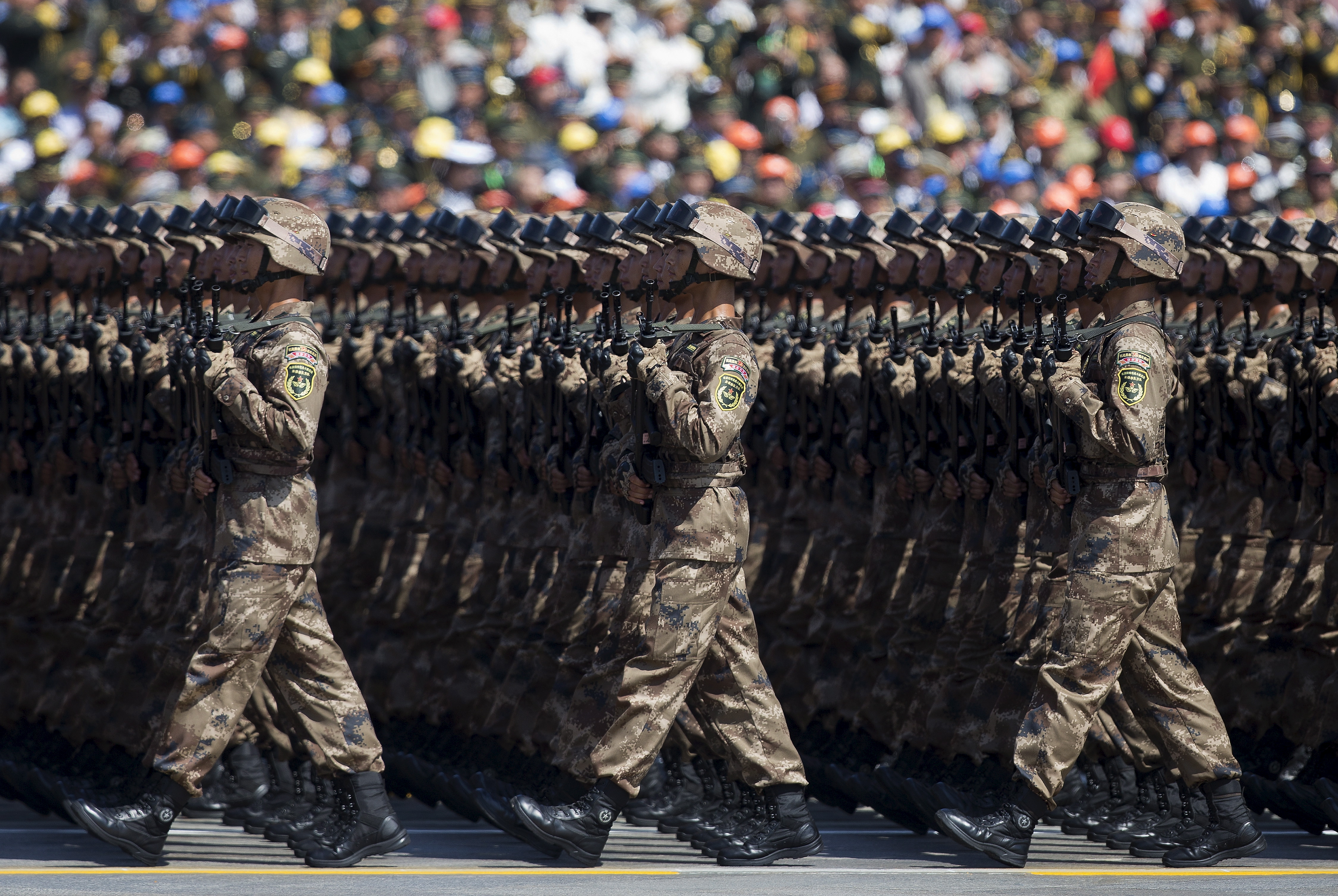China's military parade was a massive display of political weakness
China has a big army. But does it have any friends?

A free daily email with the biggest news stories of the day – and the best features from TheWeek.com
You are now subscribed
Your newsletter sign-up was successful
Yesterday, in the lead-up to China's parade celebrating the 70th anniversary of Japan's defeat in World War II, President Xi Jinping welcomed foreign dignitaries and leaders from around the world who had traveled to Beijing. One by one, each walked the red carpet and shook hands with Xi and his wife.
The odd thing about the procession was that very few of the dignitaries were actually notable. Among others who made the trip were the president of Belarus, Vice Marshal Choe Ryong Hae of North Korea, Vice President Miguel Díaz-Canel of Cuba, President Nicolás Maduro of Venezuela, and President Mamnoon Hussain of Pakistan. And, of course, Vladimir Putin of Russia.
China's parade may have demonstrated military strength, but politically China showed astonishing weakness. The People's Republic, for all of its newfound prestige and power, could not get many of its neighbors and not a single Western head of state to attend. It prompts the question: Does China have any real friends?
The Week
Escape your echo chamber. Get the facts behind the news, plus analysis from multiple perspectives.

Sign up for The Week's Free Newsletters
From our morning news briefing to a weekly Good News Newsletter, get the best of The Week delivered directly to your inbox.
From our morning news briefing to a weekly Good News Newsletter, get the best of The Week delivered directly to your inbox.
World War II — or as China calls it, the Chinese People's War of Resistance Against Japanese Aggression and the World Anti-Fascist War — was a great tragedy for the Chinese people. Fourteen million Chinese were killed in the war, in large part by invading Japanese forces.
Seventy years later, China is a different country. It has secure borders, and will probably never be invaded again. It has lifted hundreds of millions out of poverty, improved health and education, and achieved a higher overall standard of living for virtually everyone.
One might think that China, having accomplished so much, might take a more mature response to international affairs. Yet its aggressiveness and ham-handed behavior have alienated many. China recently laid claim to 90 percent of the South China Sea — a claim that tramples competing claims by neighbors including Malaysia, Indonesia, the Philippines, and Brunei. Those same countries were invited to the parade, but few actually attended. It's not hard to see why.
China's human rights record has also been a persistent problem. The treatment of ethnic minorities, political dissidents, and others has been a particular sore point with the West. Yesterday's parade was preceded by a mass arrest of 200 human rights lawyers in China. In the past, Beijing might have waited until the parade was over to conduct a crackdown. Now, it does so without thought of consequences.
A free daily email with the biggest news stories of the day – and the best features from TheWeek.com
Many Western political leaders reportedly had a problem with the militaristic nature of the parade and questioned whether or not such a massive display of strength had alternate agendas. After all, it's difficult to understand how parading intercontinental ballistic missiles down a Beijing thoroughfare celebrates peace. China also made a point of including several types of weapons that could be used in the South China Sea and against the United States — helpfully labeling them in English so that everyone knew what they were.
Finally, another reason for the low Western turnout was fears the event would be one giant anti-Japan celebration. While grounded in real tragedy, China's playing of the victim card is clearly now being used for nationalist purposes, giving the Chinese people an external enemy to hate, while attempting to split the U.S.-Japan alliance.
The red carpet walk was a small but important moment. Had Barack Obama, David Cameron, or Francois Hollande been there, it would have shown that China was a welcome, respected member of the international community. Instead, China could not cajole a single major Western leader into attending a parade commemorating the end of World War II, which is generally considered by everyone to have been a good thing.
Imagine if China actually tried to get something done in the international arena. Who could it count on, other than countries that shared the same interests?
Certainly, China has friends: Russia, Zimbabwe and Venezuela come to mind. But those countries lie outside the mainstream of the international community, and for good reason. They are totalitarian or semi-totalitarian states with repressive policies. In his speech, Xi Jinping boasted that China was a founding member of the United Nations, but aside from Russia, not a single major representative of the U.N. Security Council attended.
Yesterday's parade may have shown China as a military power with few equals. But it also showed the country as one with few friends.
Kyle Mizokami is a freelance writer whose work has appeared in The Daily Beast, TheAtlantic.com, The Diplomat, and The National Interest. He lives in San Francisco.
-
 5 cinematic cartoons about Bezos betting big on 'Melania'
5 cinematic cartoons about Bezos betting big on 'Melania'Cartoons Artists take on a girlboss, a fetching newspaper, and more
-
 The fall of the generals: China’s military purge
The fall of the generals: China’s military purgeIn the Spotlight Xi Jinping’s extraordinary removal of senior general proves that no-one is safe from anti-corruption drive that has investigated millions
-
 Why the Gorton and Denton by-election is a ‘Frankenstein’s monster’
Why the Gorton and Denton by-election is a ‘Frankenstein’s monster’Talking Point Reform and the Greens have the Labour seat in their sights, but the constituency’s complex demographics make messaging tricky